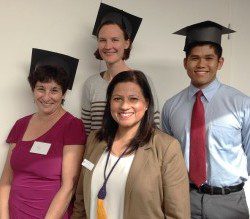
Local palliative care volunteers are in the spotlight on the eve of the annual Palliative Care Week.
To mark the special week, the South Western Sydney Local Health District (SWSLHD) has highlighted the work performed by volunteers.
It also congratulated recent graduates of a palliative care volunteer program just days out from Palliative Care Week, which will run from this Sunday, May 24 to Saturday, May 30.
SWSLHD Director of Palliative Care, Janeane Harlum, said the role of the palliative care volunteers was to support patients and their families by providing compassion, companionship and comfort.
“Palliative care is specialist care provided for people living with a life limiting illness and for whom the primary goal is quality of life,” Ms Harlum said.
SWSLHD palliative care volunteer coordinator Arlene Roache said volunteers complemented the services provided by the doctors and nurses in hospitals and in the community.
“Congratulations and thank you to the 15 volunteers who graduated from the SWSLHD palliative care volunteer program,” Ms Roache said.
“All volunteers undertook a comprehensive training program which enables them to extend practical care and support to patients and their families,” she said.
Campbelltown resident Elizabeth-Ann Rullis recently moved back to the area from the South Coast and recently undertook the training to become a palliative care volunteer.
Elizabeth is a diversional therapist who has worked in aged care for 23 years.
“There is a big need for volunteers in the area of palliative care,” Elizabeth said.
“The best thing you can do for patients and their families is to give them your time and just be there to listen to them,” she said.
During National Palliative Care Week, Palliative Care Australia (PCA) is encouraging Australians to share a coffee with those close to them and discuss their wishes for end of life care.
Ms Harlum said people needed to be comfortable and confident to ask for the care they wanted.
“Talking can be difficult. But talking about end of life wishes in a calm environment ahead of big decisions can make it easier,’’ Ms Harlum said.
“A care plan is one way to express wishes and to make arrangements for after death,” she said.
For details on advance care planning visit www.palliativecare.org.au
To become a SWSLHD Palliative Care Volunteer or for more information call 8738 9755.
